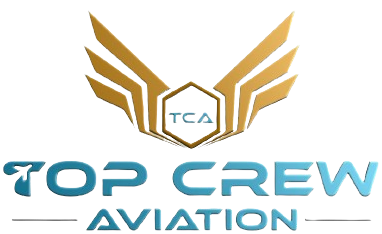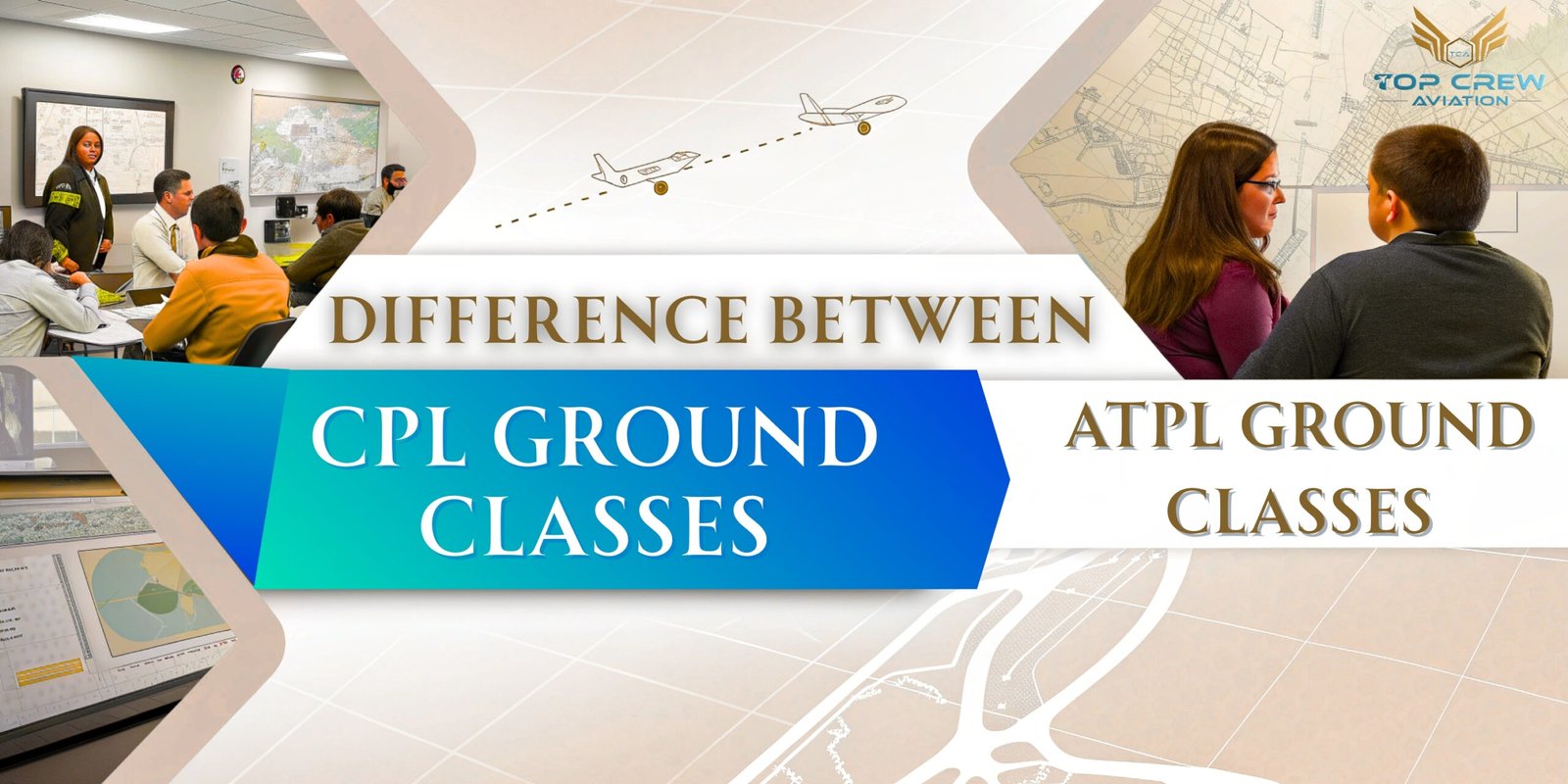Introduction
Aviation is one of the most exciting and rewarding career options today. Every aspiring pilot dreams of flying commercial airplanes and eventually becoming an airline captain. However, becoming a professional pilot requires proper pilot training in India, DGCA-approved courses, and the right licenses. Two of the most important stages in a pilot’s career are CPL Ground Classes and ATPL Ground Classes.
Understanding the difference between CPL and ATPL Ground Classes is crucial for anyone planning a career in aviation. Choosing the right course at the right time can make your journey smooth and successful. In this article, we will explain everything about CPL and ATPL Ground Classes, including their eligibility, subjects, career impact, and why Top Crew Aviation is one of the best institutes for DGCA CPL Ground Classes and DGCA ATPL Ground Classes.
What are CPL Ground Classes?
CPL Ground Classes are designed for aspiring pilots who want to start a career in aviation. CPL stands for Commercial Pilot License (CPL), which is the first professional license a pilot needs to start flying commercially. These ground classes are focused on teaching the theoretical knowledge required for DGCA exams and flight training.
Subjects Covered in CPL Ground Classes
CPL Ground Classes cover several key subjects essential for becoming a commercial pilot:
- Air Navigation – Learn how to navigate airplanes safely using charts, instruments, and navigation aids.
- Aviation Meteorology – Understanding weather patterns, forecasts, and how weather affects flight operations.
- Air Regulations – Study the rules and regulations that govern aviation in India and internationally.
- Technical General (Aircraft & Engines) – Basic knowledge of aircraft systems, engines, and maintenance.
- Radio Telephony (RTR) – Communication skills required for contacting air traffic control.
After completing CPL Ground Classes, students can start flight training and appear for DGCA exams to obtain their Commercial Pilot License (CPL).
What are ATPL Ground Classes?
Once a pilot has obtained a CPL and gained some flying experience, the next step is ATPL Ground Classes. ATPL stands for Airline Transport Pilot License (ATPL), which is required to become a captain in an airline.
ATPL Ground Classes are advanced courses focusing on high-level aviation knowledge needed for airline operations. These classes are essential for pilots who want to advance their pilot career in India and internationally.
Subjects Covered in ATPL Ground Classes
ATPL Ground Classes cover more advanced topics compared to CPL:
- Advanced Air Navigation – Detailed understanding of navigation systems and instruments for airline operations.
- Advanced Aviation Meteorology – Complex weather situations, airline route planning, and decision-making.
- Radio Aids and Instruments – Modern aircraft instruments and communication systems.
- Air Regulations (Advanced) – Airline-level rules and international aviation regulations.
After completing ATPL Ground Classes, pilots can earn their ATPL license, allowing them to fly as airline captains and take leadership roles in aviation.
Key Differences Between CPL and ATPL Ground Classes
Understanding the difference between CPL and ATPL Ground Classes helps aspiring pilots plan their career path effectively.
| Feature | CPL Ground Classes | ATPL Ground Classes |
| Eligibility | 12th pass (Physics, Chemistry, Math) + Medical Fitness | Valid CPL + Minimum flying hours (usually 200+ hours) |
| Purpose | Entry-level training for commercial flying | Advanced training for airline captain role |
| Subjects | Air Navigation, Meteorology, Air Regulations, Technical General, Radio Telephony | Advanced Air Navigation, Advanced Meteorology, Instruments, Radio Aids, Air Regulations (Advanced) |
| Career Path | Co-pilot / First Officer | Airline Captain |
| Exams | DGCA CPL Exams | DGCA ATPL Exams |
| Experience Required | None | CPL holder with flying experience |
| Outcome | Obtain Commercial Pilot License | Obtain Airline Transport Pilot License |
Eligibility Criteria
CPL Ground Classes Eligibility
- Must have passed 12th standard with Physics, Chemistry, and Mathematics (PCM).
- Age should be 17 years or older.
- Must meet DGCA medical standards (Class 1 medical certificate).
ATPL Ground Classes Eligibility
- Must hold a valid CPL license.
- Should have completed minimum flying hours as required by DGCA.
- Must meet DGCA’s Class 1 medical standards.
Career Opportunities After CPL
Completing CPL Ground Classes and obtaining a CPL license opens many career opportunities in aviation:
- Co-pilot / First Officer in airlines
- Corporate pilot for private jets
- Cargo pilot
- Flight instructor after experience
CPL is the foundation for any professional pilot. Without it, you cannot apply for ATPL or captain positions in airlines.
Career Opportunities After ATPL
ATPL Ground Classes prepare pilots for senior positions in airlines. After obtaining an ATPL license, career opportunities include:
- Airline Captain – Lead pilot responsible for the flight and crew.
- Senior Commercial Pilot – Experience in long-haul international flights.
- Flight Training Instructor (Advanced level) – Teaching new pilots at airline academies.
ATPL is considered the highest pilot certification and is key to a long-term airline career.
Why Top Crew Aviation is the Best Choice
Choosing the right academy for CPL and ATPL Ground Classes is critical. Top Crew Aviation is one of India’s leading aviation training institutes and has helped many students achieve their dreams. Here’s why:
- DGCA-approved courses – Both CPL and ATPL Ground Classes follow the latest DGCA syllabus.
- Experienced instructors – Learn from pilots with real airline experience.
- Mock tests & exam preparation – Regular assessments ensure success in DGCA exams.
- Affordable course fees – Quality training at reasonable prices.
- Career guidance – Assistance with airline placements and interview preparation.
By training with Top Crew Aviation, students gain confidence, skills, and a clear roadmap to becoming successful pilots.
Tips for Success in CPL and ATPL Ground Classes
- Focus on theory and practice equally – Ground classes are as important as flight training.
- Regular study schedule – Allocate fixed hours daily for subjects like navigation and regulations.
- Use mock exams – Practice DGCA mock exams to understand the exam pattern.
- Seek guidance from instructors – Don’t hesitate to ask questions to clear doubts.
- Stay updated with aviation news – Knowing real-world aviation scenarios helps in exams and career growth.
Conclusion
Both CPL Ground Classes and ATPL Ground Classes are crucial for shaping a pilot’s career. CPL is the first step that provides the foundation, while ATPL prepares pilots for leadership roles in airlines.
Choosing the right training institute, like Top Crew Aviation, ensures DGCA-approved education, expert guidance, and career opportunities. Understanding the difference between CPL and ATPL Ground Classes allows aspiring pilots to make informed decisions and plan a successful aviation career.
Remember, every airline captain started their journey with CPL, followed by ATPL. With proper training, dedication, and guidance, you can achieve your dream of flying high in the aviation industry.

